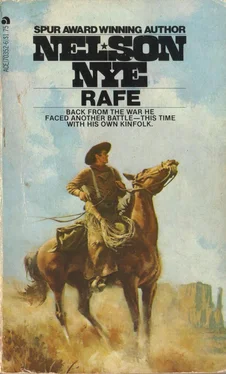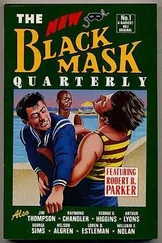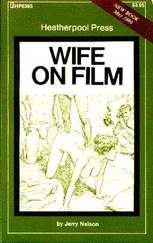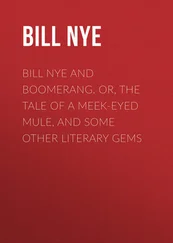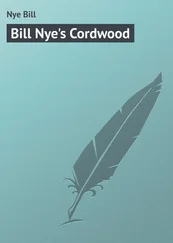Nelson Nye - Rafe
Здесь есть возможность читать онлайн «Nelson Nye - Rafe» весь текст электронной книги совершенно бесплатно (целиком полную версию без сокращений). В некоторых случаях можно слушать аудио, скачать через торрент в формате fb2 и присутствует краткое содержание. Жанр: Старинная литература. Описание произведения, (предисловие) а так же отзывы посетителей доступны на портале библиотеки ЛибКат.
- Название:Rafe
- Автор:
- Жанр:
- Год:неизвестен
- ISBN:нет данных
- Рейтинг книги:5 / 5. Голосов: 1
-
Избранное:Добавить в избранное
- Отзывы:
-
Ваша оценка:
- 100
- 1
- 2
- 3
- 4
- 5
Rafe: краткое содержание, описание и аннотация
Предлагаем к чтению аннотацию, описание, краткое содержание или предисловие (зависит от того, что написал сам автор книги «Rafe»). Если вы не нашли необходимую информацию о книге — напишите в комментариях, мы постараемся отыскать её.
Spangler was a tough man to come up against. Rafe found that out the hard way after being ambushed, beaten-up and left to die. But the tide was turned the day Rafe got his split-second's edge.
Rafe — читать онлайн бесплатно полную книгу (весь текст) целиком
Ниже представлен текст книги, разбитый по страницам. Система сохранения места последней прочитанной страницы, позволяет с удобством читать онлайн бесплатно книгу «Rafe», без необходимости каждый раз заново искать на чём Вы остановились. Поставьте закладку, и сможете в любой момент перейти на страницу, на которой закончили чтение.
Интервал:
Закладка:
Rafe's scowl deepened. Since he wasn't able to see any cattle it seemed a likely assumption he was probably still on Gourd and Vine range. And if those hills hid the ranch—he couldn't see any others close enough to matter—the rendezvous where he'd lost Bathsheba must be some place west, how far he had no notion. But a powerful long way for a man to have to go in high-heeled boots.
He picked up the reins, clucked to the roan and started walking.
The horse didn't balk but after an hour of increasing heat Rafe stopped to pull off the saddle and blanket; then with handfuls of grass he rubbed the roan down. Retrieving the rifle, he looked a long time at the saddle before abandoning it; he caught up the canteen, filled his hat with the tepid water and let the horse drink. Taking up the reins once more, he again moved west.
One thing he hoped more than anything else: that, at least, he was headed in the right direction. It wasn't himself he was worried about as much as it was the Old Man and the girls. If Duke and Spangler came onto them now things could get pretty sticky.
The sun heeled lower, the sharpening shadows dancing farther behind. Like romping dogs, Rafe wearily thought as, at ever-widening intervals, his reddened eyes sought the backtrail. His swollen feet ached miserably, then it got so they didn't seem part of him any more, more like something tied on he had to pull against his will. This got him thinking of horses, and he began to consider getting back on the roan. But this unaccountably clashed with some unexplainable ingrained concept he could neither unravel nor shake the shame out of; it surely did gravel him. "What the hell's a horse for!" He heard himself shouting like some zany old fool. He also discovered he had finally quit sweating, and this scared him into some semblance of sanity.
He quit walking to think, but all he could think of was getting off his blistered feet. The only sensible answer was right behind him. He twisted his head and took a furious look. Abruptly—to make sure he bested temptation—he peeled the roan's bridle and pitched it away. When his eyes wouldn't leave it, he stomped the tooled leather out of sight in the sand.
Then he set off again.
Peering into the orange blaze of the sun he couldn't find the hills he'd picked out for steerage. The blue hills of home . The wistful sound of it made him curse. He thought of getting out of his boots, abandoning them, like the saddle and the bridle and the emptied canteen. His feet were so swollen he couldn't get the boots off. He couldn't bear to cut them so he went stumbling on.
The hills swam into his thinking again. He made a dogged search and saw them grayly back of him, away off to the south. He had to wrestle this around a while before he got the sense of it, before he was able to realize he must have come farther than he'd been minded to suppose. He hopefully reflected he was probably not more than a couple of miles off his goal—that eastern drop to the floor of the roughs where he'd lost Bathsheba and where Brownwater Bill had said they would meet. Not even the astonishing discovery of the crazy staggering look of his tracks was able entirely to eradicate the notion.
He could be very near. This was rough-looking country filled with swirls of fluted sand, the very convolutions of which might tend to hide from a man afoot any sign of the drop-off until he reached its brink. He began to look for the churned-up area where he'd made his fight and, with Brownwater's help, had escaped from the crew.
He couldn't find even one hoofprint, but in this surge of restored confidence refused to be shaken. Wind could have done that. He floundered on, topping ridge after ridge, his burning eyes encountering nothing but the mauve look of more sand ahead with the sun squatting on it like a disc of molten copper. He wouldn't let himself believe he was lost, not even when outcrops of rock began occasionally to show like broken ribs among the dunes.
Once, remembering the roan, he took another backward look, but the horse was gone, vanished in the immensity of darkening desolation. The air was still furnace hot. His throat was cotton dry. A terrible thirst began to plague him, cutting through all other miseries.
The sun's face was half-buried when he dragged the chin off his chest to go staggering on with his tatters of hope. In its failing light something clutched at his shins. He thought the land fell away until he felt the grate of sand between his teeth and realized it was only himself that had fallen. God, what luxury to be perfectly still! The blessed peace of resignation—but resignation was surrender. Another name for death.
He struggled onto an elbow, scowling back at the tangled look of his legs and the outcrop of rotten rock that had spilled him. With a sense of outrage he said: "Son of a—!" and stopped, jaw sagging, his eyes about ready to pop from his head.
He clawed onto his knees and scrabbled back to the rock. When at last he stood up he was shaking all over. Like a man half asleep his fixed stare quartered the land. He had no remembrance of picking anything up but a chunk of the rock was in his hand. The rifle he'd been carrying was completely forgotten when he faced west again to go stumbling on.
It was almost full night when he came out on the rimrock and saw the dark gulf of the badlands below. Nothing stirred down there. No sound came up. The cliff-hung trail where he'd lost Bathsheba might be north of him or south. It was nobody's guess, and too stinking black to tell if the ground was scuffed or not.
Out of desperation he did a crazy thing. From a creosote bush he stripped an armful of branches, packed them back to the edge of the rim and put a match to them. It was a calculated risk. He had known the moment he found the bush he was in the wrong place, because where he had tangled with the Bender crew there had been no wood—they had had to use grass; and there was no grass here, only a few stunted bushes.
With a fascinated, more-than-half-defiant dread, he watched flames leap from the resinous branches, orange and blue, the explosive colors of grease. On this bare lip they could be seen for miles. Would they fetch Spangler's gunhawks or Brownwater Bill?
XIV
They found him all right.
This fat wood burned fast. He had to scurry about in the jump of his shadow, pulling up more bushes or see the blaze die before he got any good from it. When he ran out of the finger-thin branches the fire burned down to a bed of bright coals. But he kept on moving, around and around the still-red eye of it, knowing the need to make sure he was seen.
Spangler, Duke and company, if they saw and had managed to get hold of fresh mounts, would investigate whether he showed himself or not; but Brownwater, having Bender and the girls on his mind, would likely prove more cautious. He would have to see Rafe before he'd risk coming in. So Rafe kept tramping, half out of his head with the wear and the strain of it and scared, by God, the man would run anyway.
He was afraid even to think what he would do if Bill did. In his present shape, afoot, without water and half starved besides, armed only with a belt gun and so dang bone-weary he could scarcely stand up, he'd have no more chance than a June frost in hell's kitchen.
He heard the strike of shod hoofs on stone, and whirled, stumbling away from the coals, snatching his pistol as he plunged into the blackness.
"That you, Rafe?"
It came up from below, Rafe almost collapsing in the shock of relief. It had to be Brownwater—nobody else wheezed like that.
An unreasoning anger rushed tumultuously through him, all he had undergone feeding this fury as he pictured Bill lallygaggin' with the girls, comfortable and safe as a frolic of church mice. Filled with it he growled, "Get 'em on up here an' hurry it up!"
Читать дальшеИнтервал:
Закладка:
Похожие книги на «Rafe»
Представляем Вашему вниманию похожие книги на «Rafe» списком для выбора. Мы отобрали схожую по названию и смыслу литературу в надежде предоставить читателям больше вариантов отыскать новые, интересные, ещё непрочитанные произведения.
Обсуждение, отзывы о книге «Rafe» и просто собственные мнения читателей. Оставьте ваши комментарии, напишите, что Вы думаете о произведении, его смысле или главных героях. Укажите что конкретно понравилось, а что нет, и почему Вы так считаете.
